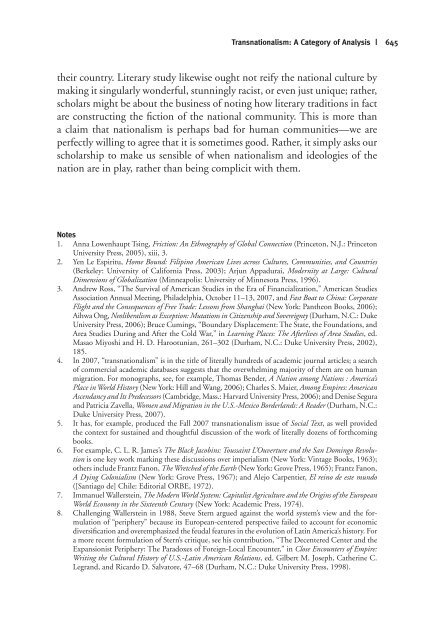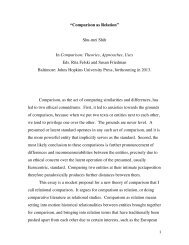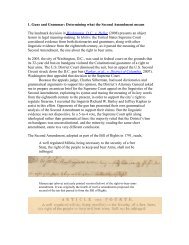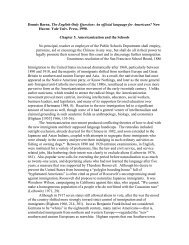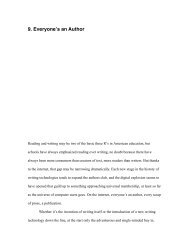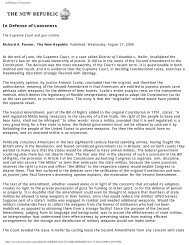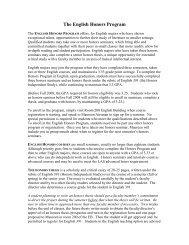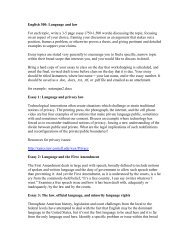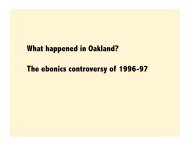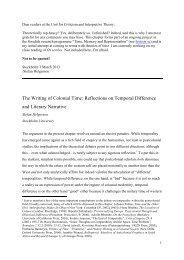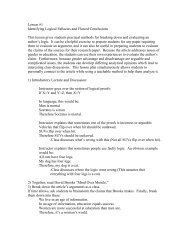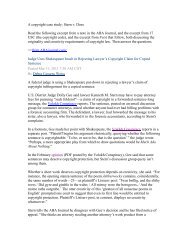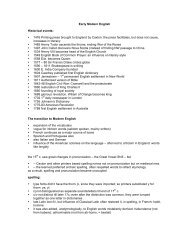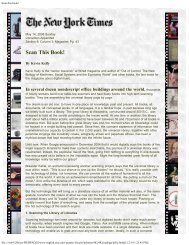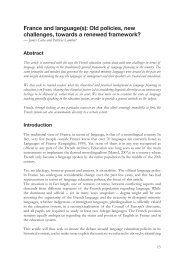Transnationalism: A Category of Analysis - Unit for Criticism and ...
Transnationalism: A Category of Analysis - Unit for Criticism and ...
Transnationalism: A Category of Analysis - Unit for Criticism and ...
Create successful ePaper yourself
Turn your PDF publications into a flip-book with our unique Google optimized e-Paper software.
<strong>Transnationalism</strong>: A <strong>Category</strong> <strong>of</strong> <strong>Analysis</strong> | 645<br />
their country. Literary study likewise ought not reify the national culture by<br />
making it singularly wonderful, stunningly racist, or even just unique; rather,<br />
scholars might be about the business <strong>of</strong> noting how literary traditions in fact<br />
are constructing the fiction <strong>of</strong> the national community. This is more than<br />
a claim that nationalism is perhaps bad <strong>for</strong> human communities—we are<br />
perfectly willing to agree that it is sometimes good. Rather, it simply asks our<br />
scholarship to make us sensible <strong>of</strong> when nationalism <strong>and</strong> ideologies <strong>of</strong> the<br />
nation are in play, rather than being complicit with them.<br />
Notes<br />
1. Anna Lowenhaupt Tsing, Friction: An Ethnography <strong>of</strong> Global Connection (Princeton, N.J.: Princeton<br />
University Press, 2005), xiii, 3.<br />
2. Yen Le Espiritu, Home Bound: Filipino American Lives across Cultures, Communities, <strong>and</strong> Countries<br />
(Berkeley: University <strong>of</strong> Cali<strong>for</strong>nia Press, 2003); Arjun Appadurai, Modernity at Large: Cultural<br />
Dimensions <strong>of</strong> Globalization (Minneapolis: University <strong>of</strong> Minnesota Press, 1996).<br />
3. Andrew Ross, “The Survival <strong>of</strong> American Studies in the Era <strong>of</strong> Financialization,” American Studies<br />
Association Annual Meeting, Philadelphia, October 11–13, 2007, <strong>and</strong> Fast Boat to China: Corporate<br />
Flight <strong>and</strong> the Consequences <strong>of</strong> Free Trade: Lessons from Shanghai (New York: Pantheon Books, 2006);<br />
Aihwa Ong, Neoliberalism as Exception: Mutations in Citizenship <strong>and</strong> Sovereignty (Durham, N.C.: Duke<br />
University Press, 2006); Bruce Cumings, “Boundary Displacement: The State, the Foundations, <strong>and</strong><br />
Area Studies During <strong>and</strong> After the Cold War,” in Learning Places: The Afterlives <strong>of</strong> Area Studies, ed.<br />
Masao Miyoshi <strong>and</strong> H. D. Harootunian, 261–302 (Durham, N.C.: Duke University Press, 2002),<br />
185.<br />
4. In 2007, “transnationalism” is in the title <strong>of</strong> literally hundreds <strong>of</strong> academic journal articles; a search<br />
<strong>of</strong> commercial academic databases suggests that the overwhelming majority <strong>of</strong> them are on human<br />
migration. For monographs, see, <strong>for</strong> example, Thomas Bender, A Nation among Nations : America’s<br />
Place in World History (New York: Hill <strong>and</strong> Wang, 2006); Charles S. Maier, Among Empires: American<br />
Ascendancy <strong>and</strong> Its Predecessors (Cambridge, Mass.: Harvard University Press, 2006); <strong>and</strong> Denise Segura<br />
<strong>and</strong> Patricia Zavella, Women <strong>and</strong> Migration in the U.S.-Mexico Borderl<strong>and</strong>s: A Reader (Durham, N.C.:<br />
Duke University Press, 2007).<br />
5. It has, <strong>for</strong> example, produced the Fall 2007 transnationalism issue <strong>of</strong> Social Text, as well provided<br />
the context <strong>for</strong> sustained <strong>and</strong> thoughtful discussion <strong>of</strong> the work <strong>of</strong> literally dozens <strong>of</strong> <strong>for</strong>thcoming<br />
books.<br />
6. For example, C. L. R. James’s The Black Jacobins: Toussaint L’Ouverture <strong>and</strong> the San Domingo Revolution<br />
is one key work marking these discussions over imperialism (New York: Vintage Books, 1963);<br />
others include Frantz Fanon, The Wretched <strong>of</strong> the Earth (New York: Grove Press, 1965); Frantz Fanon,<br />
A Dying Colonialism (New York: Grove Press, 1967); <strong>and</strong> Alejo Carpentier, El reino de este mundo<br />
([Santiago de] Chile: Editorial ORBE, 1972).<br />
7. Immanuel Wallerstein, The Modern World System: Capitalist Agriculture <strong>and</strong> the Origins <strong>of</strong> the European<br />
World Economy in the Sixteenth Century (New York: Academic Press, 1974).<br />
8. Challenging Wallerstein in 1988, Steve Stern argued against the world system’s view <strong>and</strong> the <strong>for</strong>mulation<br />
<strong>of</strong> “periphery” because its European-centered perspective failed to account <strong>for</strong> economic<br />
diversification <strong>and</strong> overemphasized the feudal features in the evolution <strong>of</strong> Latin America’s history. For<br />
a more recent <strong>for</strong>mulation <strong>of</strong> Stern’s critique, see his contribution, “The Decentered Center <strong>and</strong> the<br />
Expansionist Periphery: The Paradoxes <strong>of</strong> Foreign-Local Encounter,” in Close Encounters <strong>of</strong> Empire:<br />
Writing the Cultural History <strong>of</strong> U.S.-Latin American Relations, ed. Gilbert M. Joseph, Catherine C.<br />
Legr<strong>and</strong>, <strong>and</strong> Ricardo D. Salvatore, 47–68 (Durham, N.C.: Duke University Press, 1998).


